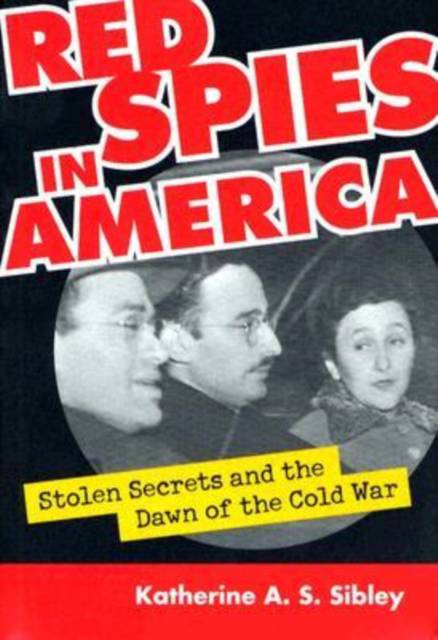
En raison d'une grêve chez bpost, votre commande pourrait être retardée. Vous avez besoin d’un livre rapidement ? Nos magasins vous accueillent à bras ouverts !
- Retrait gratuit dans votre magasin Club
- 7.000.000 titres dans notre catalogue
- Payer en toute sécurité
- Toujours un magasin près de chez vous
En raison de la grêve chez bpost, votre commande pourrait être retardée. Vous avez besoin d’un livre rapidement ? Nos magasins vous accueillent à bras ouverts !
- Retrait gratuit dans votre magasin Club
- 7.000.0000 titres dans notre catalogue
- Payer en toute sécurité
- Toujours un magasin près de chez vous
Red Spies in America
Stolen Secrets and the Dawn of the Cold War
Katherine A S Sibley
Livre relié | Anglais
57,95 €
+ 115 points
Format
Description
When the United States established diplomatic ties with the Soviet Union in 1933, it did more than normalize relations with the new Bolshevik state-it opened the door to a parade of Russian spies. In the 1930s and 1940s, Soviet engineers and technicians, under the guise of international cooperation, reaped a rich harvest of intelligence from our industrial plants. Factory layouts, aircraft blueprints, fuel formulas-all were grist for the Soviet espionage mill. And that, as Katherine Sibley shows, was just the beginning. While most historians date the onset of the Cold War with American fears of Soviet global domination after World War II, Sibley shows that it actually began during the war itself. The uncovering of atomic espionage in 1943 in particular not only led to increased surveillance of our ostensible Russian allies but also underscored a growing distrust of the Soviet Union that would eventually morph into full-blown hostility. Meticulously documented through exhaustive new research in American and Soviet archives, Sibley's book provides the most detailed study of Soviet military-industrial espionage to date, revealing that the United States knew much more about Soviet operations than previously acknowledged. She tells of spies like Steve Nelson and Clarence Hiskey, who passed on information about the Manhattan Project; moles within the federal government like Nathan Silvermaster; and Soviet agents like Andrei Schevchenko, who pressed defense workers to divulge high tech secrets. At the same time, as Sibley shows, hundreds of other Red agents went completely undetected. It was only through the revelations of defectors, and the postwar cracking of Soviet codes, that we began to fully understand these breaches in our national security. Sibley describes how our response to this wartime espionage shaped a generation of Red-baiting-triggering loyalty programs, blacklists, and the infamous HUAC hearings-and how it has clouded U.S.-Russian relations down to the present day. She also reviews recent cases-John Walker, Jr., Aldrich Ames, Robert Hanssen-that demonstrate how Russian efforts to gain American secrets continues well into our present times. For Cold War-watchers and spy aficionados alike, Sibley's work spells out what we actually knew about communist espionage and suggests how and why that knowledge should also shape our understanding of intelligence in the Age of Terrorism.
Spécifications
Parties prenantes
- Auteur(s) :
- Editeur:
Contenu
- Nombre de pages :
- 370
- Langue:
- Anglais
Caractéristiques
- EAN:
- 9780700613519
- Date de parution :
- 17-11-04
- Format:
- Livre relié
- Format numérique:
- Genaaid
- Dimensions :
- 162 mm x 240 mm
- Poids :
- 698 g

Les avis
Nous publions uniquement les avis qui respectent les conditions requises. Consultez nos conditions pour les avis.






